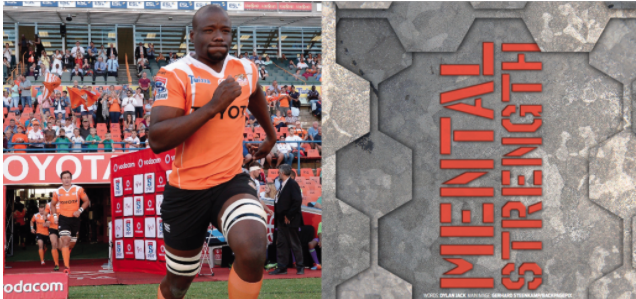Proactive interactions with a therapist helped Oupa Mohoje overcome a career-threatening injury, writes DYLAN JACK in the latest SA Rugby magazine.
READ: What’s in our latest issue?
Coming off a strong debut season in the Pro14 – where the Cheetahs made the quarter-finals – Mohoje was full of confidence going into the 2018-19 season. Having taken the captain’s armband from Francois Venter, it was one of Mohoje’s proudest moments as he led his team out at Thomond Park.
The dream became a nightmare 14 minutes into the match, when the loose forward landed awkwardly after taking a pass from Shaun Venter, injuring his knee in the process.
‘It’s a pain I have never felt in my life,’ Mohoje tells SA Rugby magazine. ‘I knew there was something seriously wrong.’
He had an anterior cruciate ligament tear and faced nine months on the sidelines.
Mohoje says that while the recovery protocols were fairly straightforward, he began to experience a feeling of loneliness without his teammates in the gym with him.
‘That was pretty tough. I felt like I was not part of the team any more. Do I really need to go to these team meetings because I am not playing? You ask yourself a lot of stupid questions. It does get very, very quiet.
‘Credit must go to my trainer, we call him Spy. He was there every time in the gym, motivating me. Even though I couldn’t feel the presence of my teammates, I felt his presence. If I had been all alone without him there, I probably wouldn’t have recovered.’
Things then became especially challenging as, after going through his nine-month recovery period and getting back on to the field during the Cheetahs pre-season for the 2019 Currie Cup, Mohoje suffered a further setback when it was discovered he had a growth on his knee.
‘I felt a very strange pain on the knee. I knew it was not normal, it was really painful. I went to the doctor and was told to go with it, it’s all in my head. At the time, it was the worst thing I could hear. Don’t tell me it’s all in the head. It really upset me.’
After undergoing a procedure on his knee, Mohoje was able to recover completely, but although he had looked after himself physically, he admits he struggled mentally and even had doubts over the future of his career.
‘I started feeling this from December until the coronavirus hit. Look, as a rugby player, you have a goal and that is to retire, say, when you are 35. You want to max out your rugby career.
‘I remember one time I was sitting in my room and I was so close to calling Mzwandile Stick and asking how he dealt with retiring at 29. It’s something you don’t want to see, but it’s a reality you also have to prepare for unfortunately. I was thinking maybe I should prepare for it, maybe my career is done. This knee didn’t want to heal and it was really uncomfortable.’
Mohoje had started seeing a therapist at the time and, after a period of introspection over his career, he decided he simply could not hang up his boots.
‘As I was writing and thinking that maybe it is time to retire, I looked at the road I had walked, a hard road but a good road too, and I felt I can’t retire right now. I would have done myself an injustice. That’s when I figured I want to max out my career. I know it sounds weird but I told my therapist and I kept a journal about it.
‘At first I thought I didn’t really need a therapist, I was reluctant to go see one. But there was a point where I felt that if I don’t do it for myself now, I don’t want to do it when I am already in the pit, when I am already burned out. It is better to prevent it, before it gets worse.
‘I knew that mentally, I was not in the right place. Especially when I was told to give the injury three more months, and then nine months became 12 months. Fifteen months later, I was still nowhere. I knew I was going to go crazy, so I decided to see a therapist so we could handle it and I could be in a better mental space.’
Mohoje encourages young players to start looking after their mental health, either by getting professional help or by finding themselves a mentor.
‘It’s important for rugby players to look after themselves because as much as you get guys whose careers are smooth, you get a lot of other players whose careers are not as smooth. We have seen a lot of players retire early, a lot of young junior players not even getting a chance to play further, only because they are not OK mentally.
‘If a young guy like that doesn’t want to see a psychologist or a therapist, if it is too early for them, they should get a mentor instead. Someone who has experience, who can tell you this is how things go, this is normal.
‘Players are always going to have another reason they didn’t make it, whereas in most cases they should blame themselves. If you are not going to see someone, just get an experienced mentor who can show you the ropes.’
Having fully recovered, Mohoje was somewhat surprised when he was handed a new contract at the Cheetahs.
‘I was relieved. It means they still have faith in me. I am not going to disappoint them in the next year or so. After a year and a half of not playing, you would expect the club to say, listen, you haven’t played for us for the past year, you haven’t healed so we can’t keep you. That was the news I was waiting to hear, honestly. The Cheetahs have been amazing, they really have had my back.’
Mohoje was set to make his comeback before the Pro14 season was halted by the Covid-19 pandemic and the country went into lockdown.
Local rugby is hopefully set to resume with an eight-team tournament – involving the Super Rugby and Pro14 teams – by the start of September.
‘I am really, really excited,’ says Mohoje. ‘I feel like with this whole lockdown situation, all the players get to start on a clean slate. They can represent themselves in the best way possible. All of us can’t wait, it’s what we love to do. Everybody’s excited to get back on the field and we are working flippen hard now so that all the seeds we have sown can benefit us when we start again.’
There is also the not-so-small matter of the British & Irish Lions tour of South Africa in 2021 to look forward to.
‘I just want to get back on to the field first,’ Mohoje says with a chuckle. ‘It’s a once-in-a lifetime opportunity. Some players start and end their careers without ever having had the chance or opportunity to showcase their talent against the Lions. So I think it would be every South African player’s dream. But the main thing – after two years out – is to step back on to the field, make that first tackle, make that first carry and I will build from there.’
Having turned 30 at the beginning of August, Mohoje reaffirms that he is by no means done with rugby.
‘There are still some things I would like to achieve, goals I have set out, but I believe they take time. I still want to play for the Boks again, I really do. That’s the main thing. I will do whatever I can for my side to put myself up for selection again.’
*This column first appeared in the latest SA Rugby magazine, now on sale!
WATCH: SA Rugby magazine teaser video
Cheetahs coach Hawies Fourie on Mohoje’s comeback …
‘Oupa recovered well from his injury. He worked really hard since we started with individual training in June. He has lost 5kg and is in better shape. I am confident he will be close to his best come the domestic tournament. Hopefully, he will play well and get his career back on track. It was tough seeing him struggle.
‘He couldn’t get back to full fitness and had to undergo a second operation. He has been out for about 21 months. When the Currie Cup starts, it will be more than two years since he has been on the field, which is a long time for any player. It will take him a bit of time to adapt, but he is working hard. His attitude is positive. He is a good leader and a positive influence in the team. We all hope he will get back to his best.’





